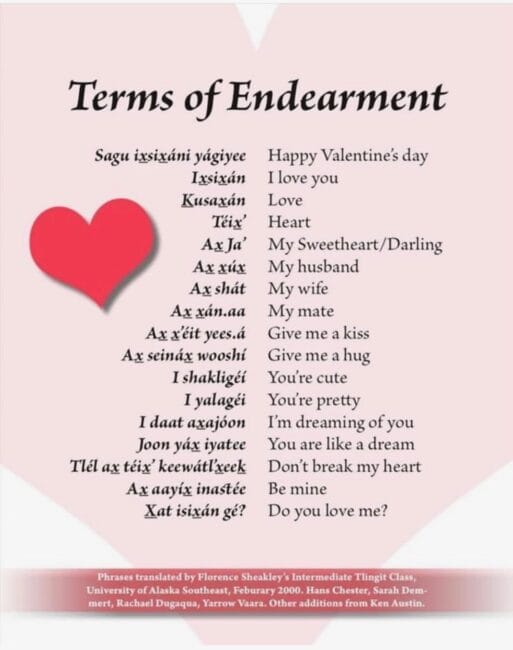how to say you care for someone in Lingít
It’s Valentine’s Day in Lingít Áaní and two local Lingít language learners shared their love language and the story of how it began.
Xeetli.éesh Lyle and Daxkilatch Kolene James almost met at a party. Lyle led a group of dancers in, and Kolene was impressed.
“I claimed at the table, ‘There’s my husband,’” she said.
She approached his father at the party and asked if he was single. Lyle’s father went and told him.
“And I never saw him,” she said.
Lyle said he lost his nerve.
“And then I almost got the nerve to go up to her table and talk to her, but as soon as I got close, I got scared and I walked out,” Lyle said. “So I actually didn’t get to meet her that evening.”
Lyle’s father went back to Kolene and told her his son was too nervous. She said, at the time, she was busy with work, school and raising her kids. She told herself she didn’t have time for romance, anyway.
“Couple months passed,” she said. “My best friend invited me out to go dancing, and so I did, and we ran into each other again on the dance floor, and I gave him my number, and the rest is history.”
Now, after decades of being together, they use Lingít to show their love for each other.
“When I’m at work, I’ll send her a text of ‘Ḵúnáx̱ ix̱six̱án ax̱ sháawadi á!’” Lyle said. “And what that translates to is, ‘I love you very much, my precious wife’ and and to translate it even more is, ‘You are the one I choose to stand with very much.’”
Kolene said messages like that, in their Indigenous language, make her feel precious.
“[It] made me feel special,” she said “I know that it’s authentic. It feels really beautiful.”
A group of University of Alaska Southeast students in Ḵaakal.áat Florence Marks Sheakley’s class saw the value of saying you care for someone in Lingít, too. They made a list of other terms of endearment.

To express care for the people you love outside of romantic relationships, Lyle has some phrases, too.
“‘I éek’ ax̱aaheen!’ means like ‘I believe in you.’ And then ‘I tóo yei yatee!’ ‘It’s in you,’” he said.
Kolene says those affirmations apply to anyone learning Lingít, too. She echoed the words of her teacher, who says the language belongs to everybody.
“It’s been part of the land and part of who we are since time immemorial, and that feels really good. So keep trying,” she said.
Lyle agreed. It’s good advice in language learning, and in love.“Don’t be afraid to make mistakes,” he said.
Sagu ix̱six̱áni yágiyee — Happy Valentines Day!

